June 17, 2025 | 19:22 GMT +7
June 17, 2025 | 19:22 GMT +7
Hotline: 0913.378.918
June 17, 2025 | 19:22 GMT +7
Hotline: 0913.378.918

Nam Huong Poultry Farming Company has a flock of half a million laying chickens. Photo: Minh Dam.
Tien Giang is a locality with developed livestock farming in the Mekong Delta, especially poultry. Currently, the province has over 16 million heads, ranking first with quite a difference from other provinces in the region.
Local poultry farming is facing many common challenges in the livestock industry such as: Increasing animal feed prices, unstable output product prices, threatening diseases, and increasingly strict technical barriers and standards.
To survive, livestock farmers are forced to change production methods, apply advanced science and technology, become more mechanized and improve product quality, especially by implementing good manufacturing practices (VietGAHP).
Visiting the chicken farm specializing in eggsof Nam Huong Poultry Breeding Company Limited (in Binh Phan commune, Cho Gao district, Tien Giang province), we met Mr Le Van Hoa, the farm owner. He shared his comments and forecasts about the livestock market in the coming time.
According to him, small-scale livestock farming will no longer be effective due to risks such as disease, and market fluctuations... will occur more and more frequently and the "resistance" of small farmers will not be equal to that of large farms.

Livestock farming is increasingly difficult due to epidemics and increasing input material prices. Photo: Minh Dam.
Analyzing more clearly, Mr Hoa said Tien Giang has a fairly developed livestock industry, however, like many localities, small and medium-scale livestock farming still accounts for the majority of output. Over the past two years, after the COVID-19 pandemic, chicken egg prices have improved, and farmers have increased the number of livestock during each restocking period. Egg production increases to the saturation point, as a consequence, the market price will decrease to equal or lower than production costs.
Meanwhile, the production cost of livestock farming is always higher than that of large-scale farms due to many factors such as: High input prices due to having to make purchases through many intermediaries, not being able to control the source of breeds, diseases causing livestock loss...
Of course, if this situation continues for a long time, small farmers will not be able to stand it. At that time, they are forced to leave the industry or invest in new technology and increase scale to reduce production costs and improve product quality.

Mr Le Van Hoa (right) visits the animal welfare program in the UK. Photo: MD.
Nam Huong Poultry Farming Company Limited was established in 2006. Over time of formation and development, this business has now become one of the leading companies in Vietnam in providing high-quality chicken breeds and clean eggs.
The company is a pioneer in applying biosafety methods to production and livestock farming according to the VietGAHP model and has brought high efficiency. The Company's clean chicken egg products are entering the market in many provinces and cities in the country, produced with a closed process from raising and caring for laying hens to egg processing using advanced technology.
Each stage, from brooders to pullets, is subjected to a very strict vaccination process. Antibiotics are not used for chickens preparing to lay, so the eggs are very clean. Every month, the Company tests for antibodies and residues in chickens and eggs to ensure clean eggs when they go to market.

Every day Nam Huong Company produces 400,000 fresh chicken eggs. Photo: Minh Dam.
However, Mr. Le Van Hoa also acknowledged that as a unit with the largest egg-laying chicken flock in Tien Giang with 500,000 chickens, producing 400,000 eggs per day, the company's breeding technology is still not the best at adapting to current market fluctuations.
The owner of a half-million chicken farm believes that he must change and become more advanced to survive. In the immediate future, Nam Huong Company aims to complete the barn, switching to high technology, converting from semi-automatic to automatic, and utilizing waste products to increase revenue and reduce production costs.
Currently, the Company has 7 breeding areas, of which 1 area has tested the breeding process using new technology quite successfully. The company is applying for an investment license to build a large-scale concentrated livestock farm with new technology and increase egg production to 1 million eggs/day.

Biological chicken manure composting system. Photo: Minh Dam.
When applying high technology to livestock farming, workers just need to sit in the control room to know all the problems happening on the farm, such as temperature, humidity, chicken condition, and food.

Chicken manure pellets are experimentally produced by Nam Huong Company. Photo: Minh Dam.
He emphasized that the new high-tech livestock area must invest in the farming environment to be successful.
“I have invested heavily in a system of microbial organic fertilizer treatment tanks. All chicken manure waste goes into that system. Composting within 15 days will produce a finished product of microbial organic fertilizer with moisture below 30%, and a protein content of about 50%. The after-product will be sold to farmers growing dragon fruit and durian, which are currently in great demand.
The scale will later triple but still keep the same workforce, thus saving electricity and operating costs. Limit human contact with livestock to ensure biosecurity from diseases and ensure food hygiene and safety", shared the owner of the largest egg-laying chicken farm in Tien Giang.
In the coming time, in addition to investing in new livestock technology, this enterprise will also focus on strengthening promotion, building a brand to bring products to be consumed in supermarkets and green department stores, and bringing clean eggs to consumers.
According to Dr Thai Quoc Hieu, Deputy Director in charge of the Tien Giang Animal Husbandry and Veterinary Sub-department, industrial chicken farming for commercial eggs in the province currently has about 1.4 million chickens on 8 farms, accounting for nearly 10% of the province's total chicken herd of 14 million.
Translated by Hoang Duy
![Turning wind and rain into action: [5] Hue applies modern technology in disaster forecasting](https://t.ex-cdn.com/nongnghiepmoitruong.vn/608w/files/news/2025/06/17/z6704423696987_15fd32ffc26d590d204d520c9dac6786-nongnghiep-093938.jpg)
(VAN) In Hue city, modern technology has recently been applied in meteorological and hydrological forecasting and warning, helping to reduce the damage caused by natural disasters.

(VAN) A cutting-edge farming technique being implemented on an experimental ranch in Arizona's Sonoran Desert has already saved a billion gallons of water over five years, according to Civil Eats.

(VAN) Poultry and pig production and the environment can be boosted through enhanced water technology, according to new research.

(VAN) Coffee prices on June 16, 2025 are unchanged. In Vietnam, local trading prices are holding steady, ranging around VND 112,000 – VND 112,500/kg.
![Turning wind and rain into action: [4] Bringing climate bulletins to remote and isolated areas](https://t.ex-cdn.com/nongnghiepmoitruong.vn/608w/files/linhnhp/2025/06/14/1152-z6704423696987_15fd32ffc26d590d204d520c9dac6786-nongnghiep-151141.jpg)
(VAN) The Vietnam Agriculture and Nature Newspaper interviewed Mr. Vu Thai Truong, Acting Head of Climate Change and Environment at UNDP Vietnam, to gain deeper insight into how climate bulletins are delivered to farmers.

(VAN) In Tien Giang, a high-tech shrimp farm has developed a distinctive energy-saving farming model that has yielded promising results.
![Turning wind and rain into action: [3] 300.000 farmers benefit from agro-climatic bulletins](https://t.ex-cdn.com/nongnghiepmoitruong.vn/608w/files/news/2025/06/12/e5a48259d6a262fc3bb3-nongnghiep-125122.jpg)
(VAN) The agro-climatic bulletin has become a valuable tool for farmers in the Mekong Delta. After more than five years of implementation, the initiative is gradually being expanded nationwide.